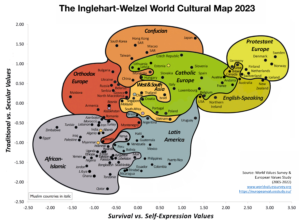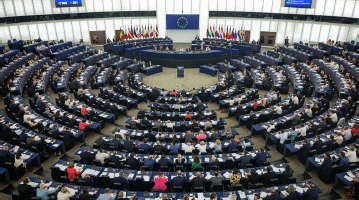The shift in values in Montenegro between 2004 and 2023 is marked by a strong return to traditional beliefs. This change can be linked to a mix of psychological, socio-economic, cultural and political factors. What`s striking is that Montenegro moved from a level of secular-rational values similar to Scandinavian countries to a value system more in line with societies like Zimbabwe, Turkey, Iran and Lebanon.

One of the key reasons behind Montenegro`s shift back to traditional values is socio-economic divisions and societal fragmentation. The growing gap between different social and economic groups, combined with a strong sense of injustice and inequality, has led to a decline in trust and cooperation within society. This is especially true in Montenegro, where these differences impact nearly every aspect of life. Trust is further eroded by perception of elitism, corruption, and political polarization.
This shift back to traditional values can really shape day-to-day life in Montenegro. People might rely more on family and close-knit communities rather than institutions, which can be great for support but also limit new opportunities. Job opportunities could become more about who you know rather than what you know, making things tricky for younger generations trying to break in on their own. Education might focus more on tradition that critical thinking, which could slow down innovation.
Even simple things like business and social interactions could feel more conservative, with less openness to new ideas or different perspectives. It`s not all bad, but it does mean change comes slower, and things might feel a bit more predictable sometimes in a good way, sometimes not so much. People are finding a sense of belonging in smaller and more exclusive groups based on religion, ethnicity, and ideology. Through subtle propaganda, religious thinking is even being framed as a rebellious, modern stance making traditional values seem like a fresh alternative rather than a step backward.
But the real issue goes even deeper, affecting something as personal and invisible as mental health. The way mental health services are set up cold, bureaucratic, and lacking privacy makes many people hesitant to seek professional help. On top of that, there are no proper regulations or a governing body for clinical psychology. Because of this, a lot of people turn to religious figures for guidance instead of trained professionals. And the problem isn`t just that these figures step in to ``help`` they often actively discourage people from reaching out to actual mental health experts. So, instead of getting real support, people end up even more deeply influenced by traditional ideologies, making it even harder to break the cycle.
The atmosphere of the church the spiritual music, religious language, the scents, the robes it`s all part of a very effective system for shaping attitudes and emotions. It`s a powerful tool for persuasion and indoctrination. At the end of the day, no one is saying the Church shouldn`t have the right to operate. But when the state knowingly steps back and allows religious institutions to take over areas that should be covered by secular systems, these kinds of societal consequences are inevitable.
Written by our correspondent A.A.



